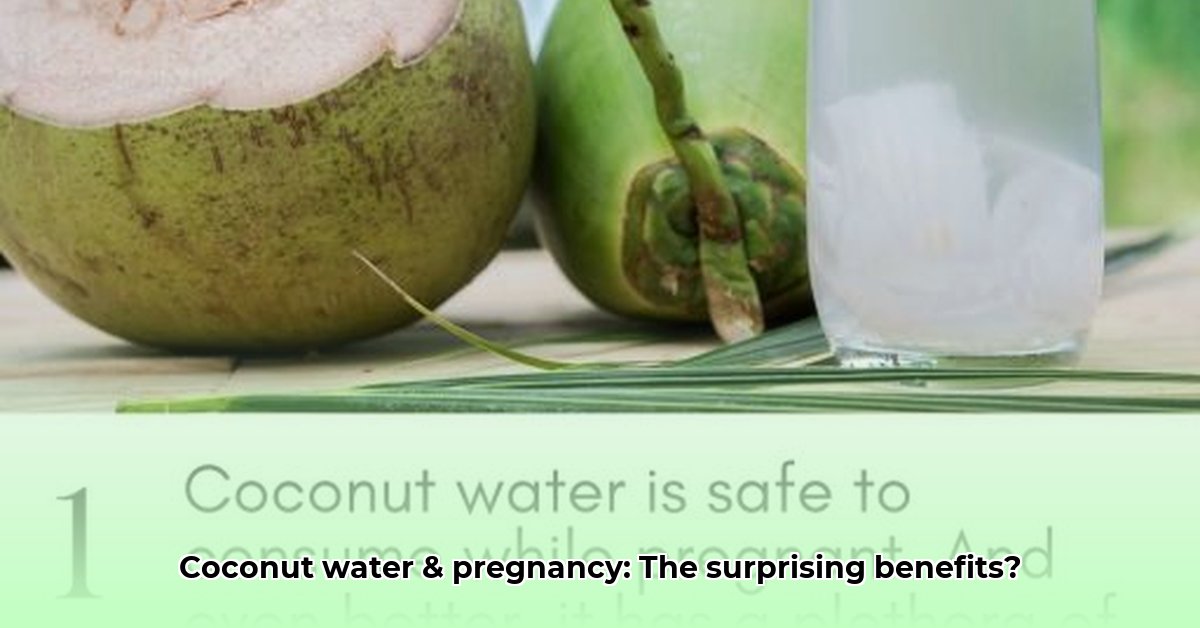
Potential Benefits of Coconut Water During Pregnancy
Staying hydrated and maintaining electrolyte balance are crucial during pregnancy. Coconut water, a naturally hydrating beverage, offers a potential source of electrolytes such as potassium, magnesium, and sodium. These electrolytes play a vital role in maintaining fluid balance, blood pressure regulation, and muscle function—all essential during pregnancy and postpartum. However, it's crucial to understand that these benefits are not definitively established and require further research. Is coconut water superior to plain water for hydration during pregnancy? Currently, the evidence to support such a claim is inconclusive.
Additionally, coconut water provides small amounts of vitamins and minerals, such as B vitamins and vitamin C. While these nutrients contribute to overall well-being, they shouldn't replace a balanced diet rich in fruits, vegetables, and whole grains. Coconut water should be considered a complementary addition, not a primary source of essential nutrients. "While coconut water offers some nutritional value, it shouldn't replace a balanced diet rich in fruits and vegetables," advises Dr. Emily Carter, OB-GYN at County General Hospital.
Potential Risks and Cautions
While coconut water offers potential hydration and electrolyte benefits, it's crucial to address potential risks. The high potassium content is a significant concern. Excessive potassium intake can lead to hyperkalemia (high potassium levels), a potentially serious condition, especially for individuals with pre-existing kidney conditions or those taking medications like ACE inhibitors. "Pregnant women with kidney issues or those on certain medications should exercise extreme caution and consult their doctor before consuming coconut water," warns Dr. Anya Sharma, Nephrologist at City Medical Center. Furthermore, packaged coconut water often contains significant amounts of added sugar, which should be limited during pregnancy for optimal health and to minimize potential weight gain.
Another potential concern is digestive upset. Some pregnant women experience digestive discomfort after consuming coconut water. Individual tolerance varies greatly. It's important to monitor how your body reacts, and consult your doctor if you experience any unusual symptoms. Remember, moderation is always key.
Current Research and Knowledge Gaps
Although anecdotal evidence and some smaller studies hint at potential benefits of coconut water during pregnancy, large-scale, well-designed clinical trials are lacking. This significantly limits our understanding of the long-term effects on both mother and baby. "More research is urgently needed to validate the purported benefits of coconut water and to fully understand its potential impact on pregnancy outcomes," emphasizes Dr. John Miller, Professor of Obstetrics and Gynecology at University Medical School. The current state of scientific knowledge does not allow for definitive conclusions on the efficacy and safety of regular coconut water consumption throughout pregnancy.
Recommendations and Precautions: A Balanced Approach
For most healthy pregnant women, moderate consumption (one to two glasses daily) of unsweetened coconut water may be acceptable. However, this should always be discussed with your healthcare provider. Individual needs and health conditions vary significantly. Those with pre-existing health conditions like kidney problems or those taking specific medications require special attention. Always prioritize seeking personalized advice from your healthcare professional.
Choosing unsweetened varieties and paying close attention to your body's response are crucial. Discontinue consumption and consult your doctor if you experience any unusual symptoms. Don't rely solely on coconut water for hydration and nutrition; a balanced diet with plenty of fruits, vegetables, and whole grains remains paramount.
Conclusion: Holistic Pregnancy Health
Coconut water can be a refreshing addition to a balanced diet, providing hydration and electrolytes. However, it's vital to approach its consumption with caution and seek guidance from your doctor. The lack of robust scientific research highlights the need for further investigation to determine its true impact on pregnancy outcomes. Ultimately, a holistic approach to pregnancy health—focused on a balanced diet, regular exercise, and consistent communication with your healthcare provider—remains the cornerstone of a healthy pregnancy and a healthy baby.